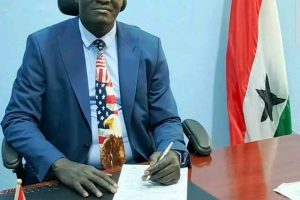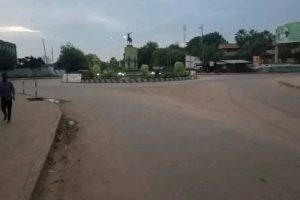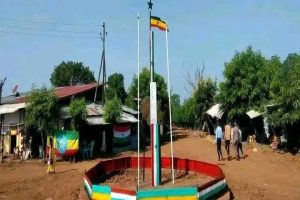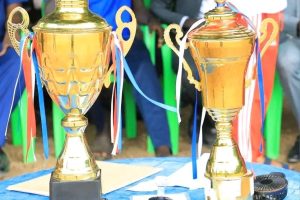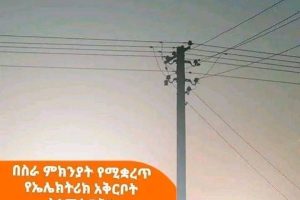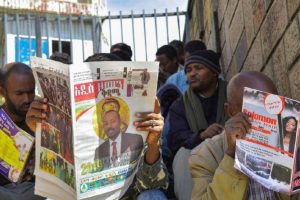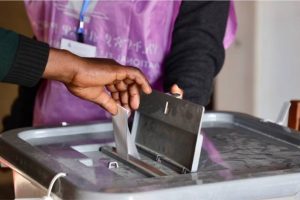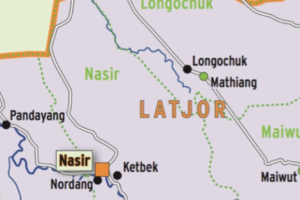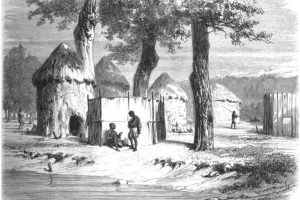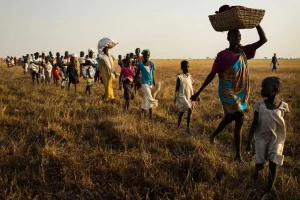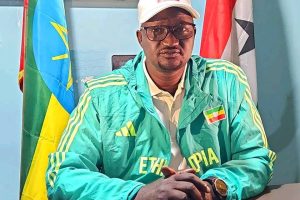Analysis and observations about August 17, 2015 peace talks on South Sudan in Addis Ababa Ethiopia, regarding IGAD-Plus Compromise Proposal and Conflict Resolution on the Republic of South Sudan.
By Lul Gatkuoth Gatluak
Tuesday: August 25, 2015
On the weekend of August 15-16, 2015, South Sudan political climate reached its boiling point at 212 degrees Fahrenheit or 100 degrees Celsius. The atmospheric precipitation elevated as the pressure mounted from world’s powerful nations arrived at a higher fixed reference point on South Sudanese leaders to sign Peace.
While thousands of South Sudanese, fellow African regional players and international community partners were enthusiastically hustling to converged in the capital of Ethiopia Addis Ababa aiming to witness the signing of the proposed compromise Agreement on South Sudan conflict. Other Billions of the world community, ordinary South Sudanese in towns, villages, bushes, Refugee camps both at home in the United Nations’ concentration sites and neighbouring countries, in addition to those of them in diaspora; were highly alerted full with hope that the peace will finally be signed on Monday August 17, 2015.
South Sudan president was dragging his feet to defy the worldwide call for peaceful compromise. In regard of that hope for peace, many South Sudanese living abroad in various countries working under different capacities, had either called in sick that day from their jobs or quit sleeping. Friends connect themselves with phone conferences and social-media to discuss some contentious issues parties to the conflict are still disagreeing upon and other challenges laying ahead.
Like other thousand South Sudanese-Americans, one stay up all night chatting on “Social-media” with friends who are present at the scene of the peace talk since the day coincided with one’s day off from work. In this article, the author is intending to highlight some push factors that culminated to force individuals like Obama to act on pressurizing South Sudanese parties to the conflict sign peace and one’s observations during the day of Monday August 17, 2015. But first, it’s worthwhile to mention some historical facts pertaining South Sudan crisis.
When the disagreement between South Sudan’s ruling party (SPLM) members exploded into violence in Juba, thousands of people have been killed and millions were driven out of their homes to either United Nations peacekeeper bases or neighbouring countries.
Since then, Violence had spread across The Greater Upper Nile region, including Unity, Jonglei, and Upper Nile States, following mass defections of the national army of the Sudan People’s Liberation Army (SPLA).
In that early stage of conflict ignition, millions were faced with food shortages that force humanitarian donors around the world to pure in food aid in order to prevent famine or humanitarian catastrophe. In order to block such manmade crisis, South Sudanese and friends of South Sudan alike, took it upon themselves and frequently communed between their respective residencies and government centres around the globe to request world’s powerful leaders to act accordingly on solving South Sudan matter.
Some prominent outstanding calls for action were made by forming rallies in Australia, Canada, the United States of America and many other countries. The tone was, “We need Peace in South Sudan”. One outstanding contribution was made by a patriotic South Sudanese named Simon Deng, who led a hungry strike to White House for one month asking President Obama to act now. His call coincided with Obama scheduled official visit to Africa, which subsequently corresponded with fourth anniversary of South Sudan independence. In his Address to African Union, Obama called on South Sudanese leaders to sign already proposed IGAD-Plus compromise proposal to resolute South Sudan’s conflict one and for all otherwise the warring parties will face sanction if they are not going to meet the dateline. Behind the scene, he also met with important individuals urging them to play positive role come scheduled date of August 17, 2015.
As the day was drawing near, South Sudanese both in government and rebels, in addition to IGAD mediators had congregated to sensitize the document. Some IGAD heads of State shuttled to Uganda to see how President Museveni stand on proposed compromise document.
Mr. Museveni was not only rigid he also came up with a parallel proposal that erased provisions which give rebels 53% upper hand in Greater Upper Nile region. A move that rebels’ chief responded by writting an accusation letter to IGAD-Plus mediators; saying, “the outcome of the Kampala summit not only contradicts but also completely undermine the IGAD-Plus Proposal that was presented to the stakeholders in July as basis to negotiate on.”
On Thursday and Friday August 13 and 14 respectively, voices to persuade Salva Kiir to attend Peace talks were roaring given that the later ruled out he will only delegate his Vice President James Wani Igga to Addis.
Instead of boarding the shuttle, Salva resorted of calling a special Council of Ministers’ meeting on Friday August 14, 2015 which have been attended by Presidential Advisors, Members of the SPLM Political Bureau, some heads of South Sudan Political Parties he has confidence in, South Sudan ten (10) States governors, Heads of independent Commissions, Chief Administrators of Abyei & Pibor, Senior members of the National Legislative Assembly and members of the Council of States.
Their meeting resolute that, all government negotiating team must be called back to Juba, Salva Kiir must not travel to Ethiopia and delegate James Wani, they also wanted to know whether Yoweri Museveni proposal of discarding IGAD-Plus has been accepted and finally, the argument that Peace could not be signed while the rift occurred in rebel camp. Out of all these five points, the prominent of all is that, the tyranny regime developed a nil hope propagating that above mentioned rift is a heck of a bigger deal.
Finally on Sunday August 16, Salva Kiir gave in out of regional presidents’ intense diplomatic pressure especially the voice of Yoweri Museveni who have a great linkage with him than the rest; and flew to Addis Ababa to join already overcrowded compatriots and the international community observers who had hoped South Sudan’s rival factions would finally reach political settlement to result almost two years conflict that torn the country desperately. Hence, early on Monday August 17, 2015 at 9:00 A.M, all delegates congregated in Sheraton Hotel in Addis Ababa Ethiopia full with euphoric expectation to chant after the peace is signed. Unfortunately, such an expectation fade away when Salva refused to broker a deal, citing looming rift in the rebel camp. He warned the function that, it would not be possible to sign a lasting peace while other opposition factions are excluded. While discussions were underway, and signatures were expected, Museveni pull-out from the venue of the peace talks in Addis Ababa and the media reasoning that he has had clashes with other regional leaders which get in his nerve and expelled him before Dr. Riek, Pagan Amum and the rest of signatories signed their part on the peace document. It has been stipulated the chairperson of IGAD regional body Prime Minister Haile Mariam Desalegn told Museveni Uganda’s support to Salva Kiir was complicating regional efforts to persuade Salva to sign the peace and angered Museveni to walk out before the peace agreement is worked out by the IGAD-Plus mediators and South Sudan parties to the conflict. When Kiir saw Museveni retreated, he as well made an attempt to evacuate the talks. Such move prompted Kenyan President Uhuru Kenyatta to engage him in the hallway. President Kenyatta’s gesture tell it all. He was verbally telling Kiir to come back and sign the document. After Salva Kiir settled to asked for 15 more days to consult with his sycophantic masses in Juba and only initialled the document, Madam Rebecca Nyandeng De Mabior widow of the SPLM/A founder Dr. John Garang, broke down and shed tears, which she later reasoned in an interview that, she cried for all people of South Sudan, whose suffering is being extended by Salva Kiir. To her, people of South Sudan do not need more consultations, they need peace and delaying peace may have serious consequences for the civilians who have suffered for 20 months of a brutal civil war. By the end of all these cycle, Riek went to press and declared that “he was surprised by Kiir’s decision.” “I didn’t know that he was not going to sign,” he said. “I couldn’t find any explanation for this because he had it all. There is no reason why he requested for more time. We had already been given enough time to consult our entities, this is a good agreement—–he had a lion’s share on many areas.” Then, the United States’ envoy to Sudan and South Sudan, described Kiir’s decision as “unexpected,” saying, he hope the president will sign the agreement soon.
What are some of the reasons Salva Kiir refused to sign the peace for?
According to the IGAD-Plus Compromise Peace Agreement Proposal (CPAP) President Kiir is required to consult First Vice President on most security issues, Salva and his cronies are not pleased with that provision. They also have substantial disagreement over number of other contentious issues ranging from power sharing, demilitarization of Juba during the transitional period, system of governance, having separate armies during the interim period until when a full amalgamation and transformation of the army is finalized. These above issues threaten Kiir and preventing him from running the country as his own property through so-called Presidential decrees.
What are some provisions SPLM/A-IO and former detainees signed on Monday August 17, 2015?
Although there had been changes, the agreement that was signed on Monday August 17, pretty much originated from July 24 Compromise Peace Proposal IGAD-Plus had availed to the parties to the conflict for further study. During the reconvened of the negotiation after parties were called back from Pagak and Juba, IGAD mediators saw some changes when the parties engaged in a dialogue. Base on new IGAD observations, President Kiir’s government will no longer control 100% on power sharing of seven States. The new arrangement give Kiir 85% while SPLM/A-IO will get away with 15% share in each of the seven States. On the other hand, SPLM/A-IO will no longer control 53% as the proposal suggested from the first place. In the three States, government will take 46% while SPLM/A-IO will take 40%, then, former detainees and other political parties will get 7% each.
At the national level, the power sharing ratio remained as the original proposal indicated with government controlling 53%, SPLM/A-IO will get 33%, then, former detainees and other political parties will again get 7% each.
The document has further indicated that, the current 325 members of the national parliament in Juba will be maintained and those who defected to rebel during the crisis will be reinstated to their previous parliamentary positions like it was before December 15, 2013. Then, SPLM/A-IO will appoint 50 additional members to the national parliament while the former detainees will appoint one additional member and political parties will appoint 17 additional parliamentarians. The fact that some stakeholders had signed the document, IGAD-Plus officials said, the peace deal signed by the two leaders on the August 17 was the final document, there will be no more discussion; when Kiir makeup his mind, he will sign it without further renegotiation to the deal.
What’s makes Kiir agree to sign the agreement?
Many factors attributed in forcing Kiir to sign. First, following his refusal to sign on Monday August 17, many important world leaders persuaded him to reverse his decision. Second, his godfather—- Yoweri Museveni’s influence had faded away. Regional leaders had back down and start to oppose his rigid stand on South Sudan. That was the reason why urged Kiir August 18 to sign peace, saying “he will not be able to reverse worldwide popular call of peace.” At that juncture, Salva Kiir who was in limbo and set himself on the boiling pot by refusing to sign is left with no choice other than agreeing to the peace with all provisions he refused to sign on Monday August 17. If Salva would have kept his word of opposing the signature, sanction would have been imposed on his rotten murderous regime. Then he and his godfather Museveni could have been cornered from mainstream world order, despite the fact that the world would withdraw its neutrality stand and throw their support on opposition.
As we are now transitioning, IGAD, AU and their partners, need to set up a commission of inquiry to investigate human rights violations and other abuses committed during the armed conflict in South Sudan and make recommendations on the best ways and means to ensure accountability, reconciliation and healing among all South Sudanese communities. Those who ordered militias to kill innocence civilians need to be held accountable without delay. A truth commissions that recommend serious cases amount to trials, reparations, and hybrid or international courts are all possible means of achieving accountability. African Union alone could not carryout this fact finding investigation given that AU has been double standard on pervious crime investigation. The fact that it failed to avail atrocity report has a bit disqualify it to act solo on that matters.
Lastly, one would not miss to express a sincere gratitude to IGAD and its partners for bringing the peace to South Sudan. We can’t wait to see an immediate establishment of the transitional Federal Government of National Unity with clear mandates and powers to implement the agreement on the bases of a federal system that prioritized good governance that vest power on ordinary citizens rather on elites. Thank You!
Very respectively
Lul Gatkuoth Gatluak
The author can be reached at either lu*********@***il.com or si**********@***oo.com
Latest Posts
Regional Security Bureau Deputy Chief Dismissed Amid Rising Insecurity
Regional Security Bureau Deputy Chief Dismissed Am.....
June 10, 2025Tragic Incident in Jabjab, Gambella Town: One Fatality Reported:
By Pam Chuol Joack, Gambella Vision reporter A tra.....
June 9, 2025Rising Ethnic Tensions Following Tragic Incident in Itang Special Woreda
By Pam Chuol Joack Gambella Vision Reporter In a d.....
June 3, 2025Conclusion of the Gambella City: 01 Kebele Football Tournament
By Pam Chuol Joack Gambella Vision Reporter The fo.....
June 1, 2025Scheduled Power Outage Notification for Gambella Region
By Pam Chuol Joack Gambella Vision Reporter On May.....
May 31, 20250 Comments
Leave a Comment Cancel reply
Opinions and Commentaries
Press Freedom Under Threat in Ethiopia Ahead of 2026 Elections
By Pam Chuol Joack, Gambella Vision Reporter Ethio.....
May 15, 2025Opposition Parties Demand Reforms for Credible Elections in Ethiopia
Opposition Parties Demand Reforms for Credible Ele.....
May 14, 2025Maiwut people have no memory lapses, they do not support the killer regime
Two days ago, there was a video clip circulating o.....
April 13, 2025The Nuer: Exploring Our Strengths, Weaknesses, Opportunities, and Threats
In this opinion piece and well supported by reputa.....
March 30, 2025The Tale of South Sudan: The Hunters vs. The free society
“I prefer dangerous freedom over peaceful slaver.....
March 9, 2025Sport
The 12th Annual Gambella Woreda Sports Competition to be played in Meti
By Pam Chuol Joack Gambella: Announcement of the.....
April 10, 2025Baskert ball stadium to be eponed
This is not news, rather a design and work being d.....
December 16, 2024Minister for Sport in Gambella wants to improve soccer program throughout the region.
The Minister for sport in Gambella ha sannouced th.....
December 15, 2024Lare Woreda Football Coach has a solution on team performance.
This is not news, rather a design and work being d.....
December 15, 2024South Sudan Won First Olympic Game, Omot helped in Puerto Rico Defeat
South Sudan is known for all the wrong reasons but.....
July 29, 2024Recent Posts
- Regional Security Bureau Deputy Chief Dismissed Amid Rising Insecurity
- Tragic Incident in Jabjab, Gambella Town: One Fatality Reported:
- Rising Ethnic Tensions Following Tragic Incident in Itang Special Woreda
- Conclusion of the Gambella City: 01 Kebele Football Tournament
- Scheduled Power Outage Notification for Gambella Region
Recent Comments
- Oballa Nyigwo on THE NUERS IN ETHIOPIA ARE NEITHER REGUGEES NOR CONFLICT INSTIGATORS
- Gatluak Nyak Titit on Dr Abiy Made the Best Decision for the people of Gambella
- Busy Goat on South Sudan Won First Olympic Game, Omot helped in Puerto Rico Defeat
- LareWGa on Stranded Nuer Cannot travel to their families in Nuer Zone
- *********@***il.com" class="url" rel="ugc external nofollow">Thuok Olock on Stranded Nuer Cannot travel to their families in Nuer Zone


